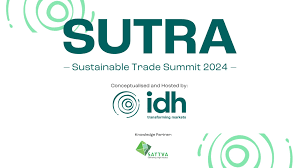IDH launches India Sustainable Palm Oil Manifesto at SUTRA 2.0: Sustainable Trade Summit 2024
Panel discussions at the summit focused on advancing sustainable farming, strengthening supply chain resilience, and accelerating public-private partnerships through technology.
IDH held the second edition of its annual event, SUTRA 2.0: The Sustainable Trade Summit 2024, at The Oberoi, Gurugram, on October 17-18, 2024. With the theme “Accelerating Responsible Sourcing in Indian Markets,” the summit brought together around 400 industry leaders, policymakers, and sustainability experts to discuss the challenges and solutions to advance responsible sourcing and sustainable supply chains. Building on the success of the inaugural summit, SUTRA 2.0 emphasised ethical and sustainable practices across key sectors such as agriculture, textiles, spices, and palm oil. The summit featured the launch of the India Sustainable Palm Oil Manifesto. The Manifesto seeks to unite stakeholders from the private sector, government, and civil society around a shared commitment to sustainable palm oil sourcing.
Sutra 2.0 featured engaging sessions, covering topics such as regenerative agriculture, innovative financing, gender-inclusive business models, and the transformative role of technology. The key speakers during the event included H.E. Marisa Gerards, Ambassador of the Kingdom of the Netherlands to India; Daan Wensing, Global CEO of IDH; Jagjeet Singh Kandal, Country Director – India, IDH; Sanjeev Asthana, CEO, Patanjali Foods; Sonali Shahpurwala, Managing Director & Head, Inclusive Banking at HSBC India; Anukool Joshi, Director Agro, PepsiCo India; Malavika Gopinath, Sustainability Lead, Olam Agri, and Vilas Shinde, Chairman of Sahyadri Farms. Their insights provided strategies for integrating sustainability into business practices, making supply chains more resilient and socially responsible.
Panel discussions at the summit focused on advancing sustainable farming, strengthening supply chain resilience, and accelerating public-private partnerships through technology. The summit highlighted the power of pre-competitive collaboration, with discussions on leveraging gender-responsive business models and innovative financing to drive sustainable trade. Breakout sessions explored key value chains such as spices, palm oil, coffee, and textiles, addressing sector-specific barriers and solutions. Additionally, the agenda featured cross-sectoral insights on sustainable procurement and regenerative agriculture, aiming to reshape industry practices for a more sustainable future.
Jagjeet Singh Kandal, Country Director – India, IDH, remarked, “Agriculture, a means of livelihood for millions, and a cornerstone of our economy and cultural heritage, stands at a critical juncture today. Not only must we contend with climate change, but we must also prioritise social equity. To ensure a sustainable future, we must focus on three pillars: environmental stewardship, economic viability, and social equity. The SUTRA 2.0 summit on responsible sourcing in India is a crucial platform that will foster important dialogue and unlock pathways to ensure that we empower our farmers while protecting our natural resources.”
The summit served as a platform to launch several new initiatives aimed at scaling sustainable sourcing in key sectors and addressing some of the pertinent challenges. These initiatives include pre-competitive collaborations in multiple sectors, as well as investment commitments to support smallholder farmers and promote climate-resilient agricultural practices.
Panel discussions at the summit focused on

